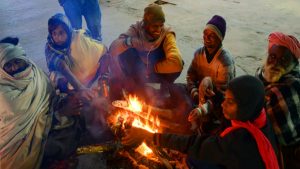 NewDelhi: The cold wave sweeping Delhi, parts of Uttar Pradesh, Bihar, Jammu & Kashmir, Rajasthan, Punjab, Haryana and Madhya Pradesh tightened its grip on Thursday.
NewDelhi: The cold wave sweeping Delhi, parts of Uttar Pradesh, Bihar, Jammu & Kashmir, Rajasthan, Punjab, Haryana and Madhya Pradesh tightened its grip on Thursday.
The national capital witnessed severe fog with a minimum temperature at 6.6 degrees Celcius and maximum temperature at 18 degrees Celcius. The minimum temperature today dipped further as compared to Tuesday when Delhi recorded the coldest day of the season – at 7 degrees Celsius – a notch below the normal.
Moderate fog shrouds Delhi on Thursday with visibility between 350 to 500 metre.
However, according to Skymet Weather, afternoons are expected to be comfortable and maximum temperatures would start increasing gradually but would continue to settle below the average temperatures.
For the last two consecutive days, maximum temperatures have been hovering around 12 degrees Celsius mark, leading to severe cold conditions. These conditions are declared when day’s maximum in plains settle below 16 degrees Celsius.
As temperatures dipped in the city, the homeless turned towards night shelters to survive the chilly winter. Popularly known as Rain Baseras, the night shelter homes are government-supported, where the homeless can spend winter nights.
The neighbouring Noida, Ghaziabad, Faridabad and Gurugram are also under the grip of a cold spate. Schools in Ghaziabad and Noida have been shut on Thursday and Friday due to the cold weather.
Similarly, the schools and colleges in Gwalior (Madhya Pradesh) will also remain shut for the next seven days due to cold wave.
According to the India Meteorological Department (IMD), isolated pockets over Punjab, Haryana, Chandigarh and Delhi, West Uttar Pradesh, Rajasthan, northern parts of Madhya Pradesh and Bihar are likely to receive severe cold day.
Leave a Reply